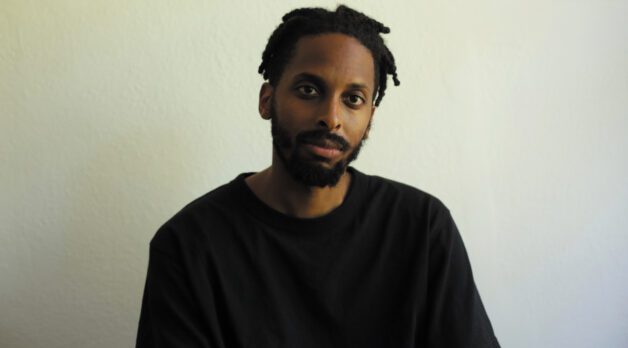Dwayne LeBlanc
 Dwayne LeBlanc
Dwayne LeBlanc

After a few years away, Booker (Barrington Darius) makes a low-key return to his old South Central Los Angeles neighborhood—ducking relatives, reuniting with an old friend on a nondescript residential block, giving a ride to a middle-aged stranger waiting for a bus and running into a friend he hasn’t seen in a while, a possibly romantically charged encounter that closes the film. Throughout Dwayne LeBlanc’s Civic (currently streaming on the Criterion Channel), the camera’s rigorously locked-down gaze is almost exclusively confined to the interior of Booker’s car as he floats down the blocks that were once his home. The area is LeBlanc’s own, and the rigorously conceived and executed short film was shot on the street where he grew up after years of planning.
Raised in Los Angeles by parents from the Caribbean island of Dominica, LeBlanc “wasn’t exposed to any idea of what making a movie was. I didn’t know that was really a job. When I would watch TV, I would see commercials. I thought, ‘That’s definitely a job, so maybe I’ll learn something adjacent to how films happen.’” After obtaining a communication and media studies degree from California State University, Northridge, LeBlanc pursued a career in marketing at music companies, including Interscope and Live Nation. “Ultimately, what I found is that there’s some creativity there in bits and pieces, but it’s really just business,” he says. “I started to pursue photography and slowly made my own film school.” That included watching a curriculum of films on a list prepared by his partner, Nicole Otero (co-writer of Civic, whose own short film credits as a director include 2019’s Slip, also currently on Criterion, and the forthcoming Wait for Night). The agenda included foundational art filmmakers like Jean-Luc Godard and Andrei Tarkovsky, with Chantal Akerman’s Le Chambre proving a particular breakthrough: “Something sparked in a different way. I thought about form and function and how those things interact with narrative. Learning that her films were tied to identify and migration solidified an understanding of how and why I was interested in film.”
When LeBlanc started conceiving Civic in 2016, he was thinking about a car’s interior as a safe space “where things happen but which isn’t really the destination.” The grants he applied for included a $25,000 award from Ghetto Film School administered through Netflix, which he received just before being admitted to the Berlinale Talents program. Working to develop the film and supplement the budget, LeBlanc bounced between weekly one-on-ones with a Netflix executive and group meetings with his Berlinale Talents cohort. Navigating Netflix’s more commercially minded imperatives and Berlinale’s more art-focused mission, LeBlanc found himself using “both sides of his brain” in a way that made sense for how he conceived of Civic. In addition to Akerman, his migratory concerns were, in part, reflected in the films of the Taiwanese New Wave, which “think about identity and migration, whether it be someone moving or someone hopping over you—colonizers changing the dynamic of what a region is.” But Civic was also guided by Steve McQueen’s observation that he made Small Axe in the spirit of producing something his mom could watch; for LeBlanc, this translated into “my mom being a metaphor for ‘my community.’ It’s very rare that I see anyone from my areas at Berlinale or Rotterdam or other film festivals, or at MoMA or other museums, but I wanted to leave that open, where it didn’t feel like I was just speaking to the arthouse world but also inviting in familiar elements that feel very tangible to my community. So, being on both sides of the fence felt very appropriate to the kind of films I want to make.”
After its three-day shoot at the end of March 2022, Civic premiered that summer on YouTube alongside the two other projects selected for the Netflix Ghetto Film School grant. That online launch seemed to preclude a meaningful festival life, but LeBlanc credits Indie Memphis and its artistic director Miriam Bale for giving the film its theatrical premiere, setting Civic on a journey that’s since included the Zurich Film Festival and International Film Festival Rotterdam.
Civic is intended to be the first part of a trilogy about migration; LeBlanc has already shot the second, You Do Not Exist, in the backyard of his mother’s house. It’s a film about someone who’s never been anywhere; the third part will be “a film I’m raising money for now, Now Hear Me Good, about someone in exile, akin to the position of artists like [James] Baldwin, [who] went to Europe in exile to create their work. The hope will be to shoot in Europe.”—Vadim Rizov/Image: Nicole Otero
